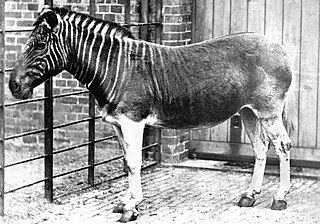
The quagga is a subspecies of the plains zebra that was endemic to South Africa until it was hunted to extinction in the late 19th century by European settler-colonists. It was long thought to be a distinct species, but early genetic studies have supported it being a subspecies of plains zebra. A more recent study suggested that it was the southernmost cline or ecotype of the species.
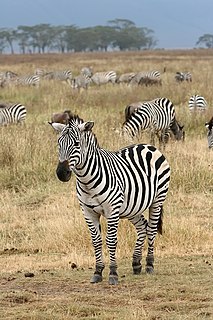
Zebras are African equines with distinctive black-and-white striped coats. There are three living species: the Grévy's zebra, plains zebra, and the mountain zebra. Zebras share the genus Equus with horses and asses, the three groups being the only living members of the family Equidae. Zebra stripes come in different patterns, unique to each individual. Several theories have been proposed for the function of these stripes, with most evidence supporting them as a deterrent for biting flies. Zebras inhabit eastern and southern Africa and can be found in a variety of habitats such as savannahs, grasslands, woodlands, shrublands, and mountainous areas.

The onager, also known as hemione or Asiatic wild ass, is a species of the family Equidae native to Asia. A member of the subgenus Asinus, the onager was described and given its binomial name by German zoologist Peter Simon Pallas in 1775. Five subspecies have been recognized, one of which is extinct.

The plains zebra, also known as the common zebra, is the most common and geographically widespread species of zebra. Its range is fragmented, but spans much of southern and eastern Africa south of the Sahara. Six or seven subspecies have been recognised, including the extinct quagga which was thought to be a separate species. More recent research supports variations in zebra populations being clines rather than subspecies.

Plestiodon inexpectatus, the southeastern five-lined skink is a common skink in the southeastern United States.
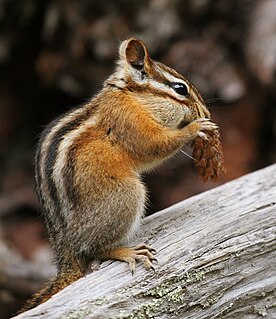
The least chipmunk is the smallest species of chipmunk and the most widespread in North America.

The spotted linsang is a linsang, a tree-dwelling carnivorous mammal, native to much of Southeast Asia. It is widely, though usually sparsely, recorded, and listed as Least Concern on the IUCN Red List.
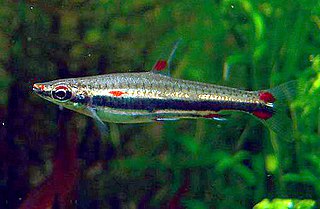
Nannostomus,, is a genus of fish belonging to the characin family Lebiasinidae. All of the species in this genus are known as pencil fish or pencilfish, a popular name that was first only applied to two species in the 1920s, Nannostomus unifasciatus and Nannostomus eques, but by the late 1950s would come to be applied to all members of the genus. Several of the species have become popular aquarium fish due to their attractive coloration, unique shape, and interesting demeanor.
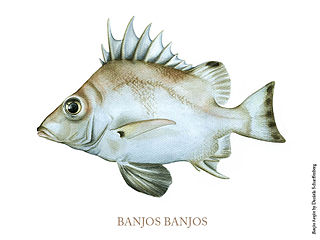
Banjos banjos, the banjofish, is a species of marine ray-finned fish from the family Banjosidae. This was formerly considered to be a monotypic family of which the banjofish was the only species. However, in 2017, two new species of banjofishes were described, the East Australian banjofish and the Timor Sea banjofish. It has an Indo-Pacific distribution.

The Abyssinian genet, also known as the Ethiopian genet, is a genet species native to Ethiopia, Eritrea, Somalia, Sudan, and Djibouti. It is listed as Data Deficient on the IUCN Red List. It is one of the least-known genet species.

The pyjama shark or striped catshark is a species of catshark, and part of the family Scyliorhinidae, endemic to the coastal waters of South Africa. This abundant, bottom-dwelling species can be found from the intertidal zone to a depth of around 100 m (330 ft), particularly over rocky reefs and kelp beds. With a series of thick, parallel, dark stripes running along its stout body, the pyjama shark has an unmistakable appearance. It is additionally characterized by a short head and snout with a pair of slender barbels that do not reach the mouth, and two dorsal fins that are placed far back on the body. It can grow up to a length of 1.1 m (3.6 ft) long.
Lophiobagrus brevispinis is a species of claroteid catfish endemic to Lake Tanganyika at the border of Burundi, the Democratic Republic of the Congo, Tanzania, and Zambia. This species grows to a length of 5.1 cm TL.
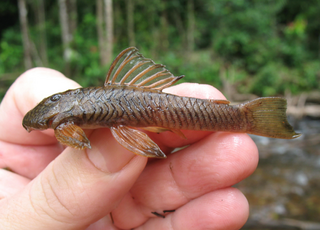
Guyanancistrus is a genus of suckermouth armored catfishes.

The Asian badger, also known as the sand badger, is a species of badger native to Mongolia, China, Kazakhstan, Kyrgyzstan, the Korean Peninsula and Russia.
Labeobarbus brevispinis is a species of cyprinid fish endemic to Cameroon in Africa.

Tridentiger is a genus of fish in the subfamily of gobies called the Gobionellinae, known commonly as the tripletooth gobies.

Ostorhinchus is a genus of ray-finned fish in the family Apogonidae native to the Indian and Pacific Oceans.

Microgobius is a genus of gobies native to the Pacific and Atlantic coasts of the Americas.

Sebastes hubbsi is a species of marine ray-finned fish belonging to the subfamily Sebastinae, the rockfishes, part of the family Scorpaenidae. This species is found in the Northwest Pacific. It grows to 15.6 cm (6.1 in) standard length.

Guyanancistrus nassauensis is a species of catfish belonging to the family Loricariidae, the suckermouth armored catfishes. It is discovered in 2005 and formally described in 2018. G. nassauensis is a rare species, highly endemic to the Nassau Mountains in Suriname, and is threatened with extinction by proposed or ongoing mining activities.
















